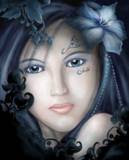The following is a list of the elements of poetry. Take the time to reflect on how each element contributes to a poem's meaning, and then brainstorm ways in which you can use it to further illuminate your own piece's meaning.
POEM: a work of literature in verse that often, but not necessarily, employs meter, rhyme, or figurative language in an attempt to communicate an aesthetic experience or statement which cannot be fully paraphrased in prose.
Poetic Devices
Speaker- voice behind the poem establishing a point of view (can be a persona)
Situation- circumstances surrounding the poem
Diction- choice of words
Syntax- grammatical order of words
Imagery- verbal expression of a sensory detail (visual, auditory, tactile, gustatory, or olfactory)
Irony- contradiction of expectation (verbal, situational, or dramatic)
Symbolism- representation in which an object or action represents something beyond itself
Basic Terms
connotation: the implied or suggested meaning connected with a word
literal meaning: limited to the simplest, ordinary, most obvious meaning
figurative meaning: associative or connotative meaning; representational
meter: measured pattern of rhythmic accents in a line of verse
rhyme: correspondence of terminal sounds of words or of lines of verse
Figurative Language
apostrophe: a direct address of an inanimate object, abstract qualities, or a person not living or present.
Example: "Beware, O Asparagus, you've stalked my last meal."
hyperbole: exaggeration for emphasis (the opposite of understatement)
Example: "I'm so hungry I could eat a horse."
metaphor: comparison between essentially unlike things without using words OR application of a name or description to something to which it is not literally applicable
Example: "[Love] is an ever fixed mark, / that looks on tempests and is never shaken."
metonymy: a closely related term substituted for an object or idea
Example: "We have always remained loyal to the crown."
oxymoron: a combination of two words that appear to contradict each other
Example: bittersweet
paradox: a situation or phrase that appears to be contradictory but which contains a truth worth considering
Example: "In order to preserve peace, we must prepare for war."
personification: the endowment of inanimate objects or abstract concepts with animate or living qualities
Example: "Time let me play / and be golden in the mercy of his means"
pun: play on words OR a humorous use of a single word or sound with two or more implied meanings; quibble
Example: "They're called lessons . . . because they lessen from day to day."
simile: comparison between two essentially unlike things using words such as "like," as," or "as though"
Example: "My mistress' eyes are nothing like the sun"
Poetic Devices
irony: a contradiction of expectation between what is said and what is meant (verbal irony) or what is expected in a particular circumstance or behavior (situational), or when a character speaks in ignorance of a situation known to the audience or other characters (situational)
Example: "Time held me green and dying / Though I sang in my chains like the sea"
imagery: word or sequence of words representing a sensory experience (visual, auditory, olfactory, tactile, and gustatory)
Example: "bells knelling classes to a close" (auditory)
symbol: an object or action that stands for something beyond itself
Example: white = innocence, purity, hope
alliteration: the repetition of consonant sounds, particularly at the beginning of words
Example: ". . . like a wanderer white"
assonance: the repetition of similar vowel sounds
Example: "I rose and told him of my woe"
elision: the omission of an unstressed vowel or syllable to preserve the meter of a line of poetry
Example: "Th' expense of spirit in a waste of shame"
onomatopoeia: the use of words to imitate the sounds they describe
Example: "crack" or "whir"
allusion: a reference to the person, event, or work outside the poem or literary piece
Example: "Shining, it was Adam and maiden"
Form
open: poetic form free from regularity and consistency in elements such as rhyme, line length, and metrical form
closed: poetic form subject to a fixed structure and pattern
stanza: unit of a poem often repeated in the same form throughout a poem; a unit of poetic lines ("verse paragraph")
blank verse: unrhymed iambic pentameter
free verse: lines with no prescribed pattern or structure
couplet: a pair of lines, usually rhymed
heroic couplet: a pair of rhymed lines is iambic pentameter (tradition of the heroic epic form)
quatrain: four-line stanza or grouping of four lines of verse
sonnet: fourteen line poem in iambic pentameter with a prescribed rhyme scheme; its subject is traditionally that of love
English (Shakespearean) Sonnet: A sonnet probably made popular by Shakespeare with the following rhyme scheme: abab cdcd efef gg
Italian (Petrarchan) Sonnet: A form of sonnet made popular by Petrarch with the following rhyme scheme: abbaabba cdecde OR cdcdcd
Its first octave generally presents a thought, picture, or emotion, while its final sestet presents an explanation, comment, or summary.
Meter
stress: greater amount of force used to pronounce one syllable over another
pause: (caesura) a pause for a beat in the rhythm of the verse (often indicated by a line break or a mark of punctuation)
rising meter: meter containing metrical feet that move from unstressed to stressed syllables
iambic (iamb): a metrical foot containing two syllables--the first is unstressed, while the second is stressed
anapestic (anapest): a metrical foot containing three syllables--the first two are unstressed, while the last is stressed
falling meter: meter containing metrical feet that move from stressed to unstressed syllables
trochaic (trochee): a metrical foot containing two syllables--the first is stressed, while the second is unstressed
dactylic (dactyl): a metrical foot containing three syllables--the first is stressed, while the last two are unstressed
spondee: an untraditional metrical foot in which two consecutive syllables are stressed
iambic pentameter: a traditional form of rising meter consisting of lines containing five iambic feet (and, thus, ten syllables)





0 comments:
Post a Comment